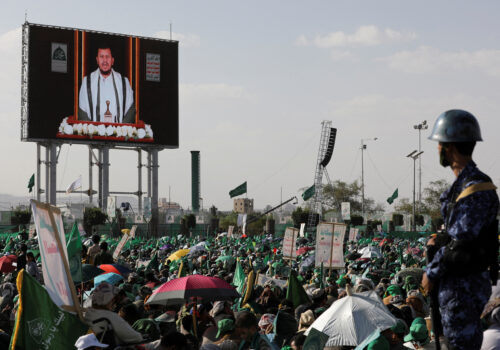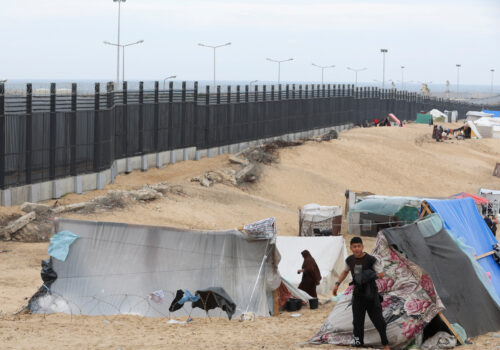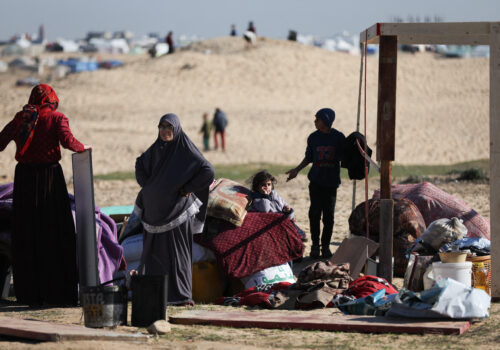Turkey and Egypt bury the hatchet, marking an end to emerging third axis in the Middle East
President Recep Tayyip Erdogan’s visit to Egypt on February 14 marked a milestone in diplomatic relations between two countries that fell grievously afoul of each other during a rare period of political and ideological divergence that lasted almost a decade.
The carefully choreographed and worded meeting between Erdogan and his Egyptian counterpart, President Abdel-Fattah el-Sisi, also served as a final burial ceremony for what was once an emerging third axis in the Middle East. This axis was distinct from the Saudi-led, pro-Western camp of Arab states that includes the United Arab Emirates (UAE), Morocco, and Jordan, as well as the Iranian-led, self-described “Axis of Resistance” consisting of Lebanese Hezbollah, Yemen’s Houthis, the Bashar al-Assad regime in Syria, and Shia militias in Iraq.
That partnership consisted of Turkey, Qatar, and movements and political parties in the Middle East and North Africa rooted in the Muslim Brotherhood and the Sunni political populism that peaked in the region following the 2011 Arab uprisings. Erdogan last visited Cairo in 2011, when he came to address the Arab League while pro-democracy and Islamist protesters were still triumphantly celebrating the toppling of longtime President Hosni Mubarak. In the afterglow of the Arab uprisings, Erdogan, then then prime minister of Turkey, was hailed as a “rock star” by Arab activists and Western thinkers for his country’s perceived model of moderate Islamic principles within a secular democracy.
SIGN UP FOR THE THIS WEEK IN THE MIDEAST NEWSLETTER
Back then, Sisi was an obscure but powerful senior army officer and a member of the Supreme Council of the Armed Forces, the body that assumed power in Egypt after removing Mubarak in 2011. He emerged from the shadows in 2013, removing and jailing democratically elected President Mohamed Morsi and rebuilding Mubarak’s autocratic military regime but with himself at the center.
Erdogan led the way in condemning the coup d’état, as he saw Morsi as a political fellow traveler. Turkey welcomed Egyptians—mostly Muslim Brotherhood or Islamist-leaning dissidents fleeing Sisi’s purges and mass arrests—allowing the activists to launch television stations and operate relatively freely. Egyptian authorities abruptly canceled Erdogan’s planned visit to the Gaza Strip via its Sinai border. Just months after the coup, in November 2013, diplomatic ties between Egypt and Turkey were downgraded.
In Sisi, Erdogan likely saw the type of military autocrat who had undermined Turkish democratic aspirations since the republic’s founding. The generals sent one of Erdogan’s political idols, the popularly elected Adnan Menderes, to the gallows in 1961, and removed his onetime political mentor, Prime Minister Necmettin Erbakan, from office in 1997.
Relations between Turkey and Egypt remained bitter for years. Egypt drew closer to Saudi Arabia and the UAE, which considered the Muslim Brotherhood their archenemy.
In 2017, the Gulf states, with the backing of Egypt, launched an unprecedented blockade of Qatar over its geopolitical ambitions and support for populist Islamic groups. Turkey came to Doha’s aid, not only airlifting emergency provisions but deploying additional troops, expanding a security cooperation deal the countries had signed in 2014.
Though tensions had been developing since Sisi’s coup, the blockade and its aftermath can be seen as marking the emergence of the third axis.
After Morsi died in prison in 2019, relations between Cairo and Ankara worsened. Erdogan described Sisi as a “tyrant” and accused him of having a direct role in the death of the ousted president, who died from a heart attack suffered while in court. “They are so cowardly that they could not even deliver his body to his family,” Erdogan said. Meanwhile, Egyptian officials accused Turkey of backing terrorist groups.
The rift impacted commerce. Turkey’s exports to Egypt fell to a twelve-year low of $2.3 billion in 2017, while Egypt’s exports to Turkey sank to a twelve-year low of $1.2 billion in 2015.
More dangerously, Turkey and Egypt—along with their respective partners—found themselves on opposite sides of armed conflicts and political struggles across the Middle East and North Africa. Ankara backed the Syrian rebels, while Sisi sought to ease tensions with President Assad. Turkey sought engagement with Iran even as Cairo’s Saudi and UAE partners, backed by then US President Donald Trump, were at the forefront of confronting Tehran.
But Libya’s civil war was the most perilous and decisive battleground between the Saudi-led axis and Turkey’s camp. Cairo and Abu Dhabi funneled arms and fighters, including fighter jets as well as Russian Wagner military forces, to warlord Khalifa Haftar’s eastern-based army as it launched an attack on Tripoli in 2019. Turkey, with the possible financial backing of Qatar, openly ferried weapons and military advisers to help defend the government in Tripoli, which included elements of the Muslim Brotherhood’s Libya branch. It was in Libya that Turkey first successfully deployed the now famous Bayraktar drones. They helped turn back Haftar’s forces in an expensive and bloody full-blown proxy war.
As 2021 began, the blockade of Qatar was ended in a deal brokered by Washington and Kuwait. Concluding the dispute made sense. For one thing, Morsi was dead. The Muslim Brotherhood and its offspring had been wiped out, along with domestic political-reform movements in the Arab world. Haftar’s expensive gamble had failed. Turkey had successfully inserted itself into the Arab world, establishing semipermanent military presences in former Ottoman lands, including Libya, Syria, Qatar, and Somalia.
Effectively, there was nothing left to fight about.
While alongside Erdogan in February, Sisi said he welcomed this “current period of calm” in the region. “I hope we can build upon it to reach lasting solutions to outstanding disputes,” he said.
Days after Erdogan’s meeting with Sisi on February 14, Turkey stripped the acquired Turkish citizenship of former Muslim Brotherhood branch leader Mahmoud Hussein and his wife, along with fifty other members of the organization.
Continuing to hold grudges would hurt both countries. As tensions have eased, trade has rebounded. Turkey’s exports to Egypt jumped to $4.5 billion in 2021, a 43-percent increase from the previous year, and to $4.5 billion in 2022. Egypt’s exports to Turkey increased from $2 billion in 2018 to a ten-year high of $2.6 billion in 2021 and a record high of $3.7 billion in 2022.
Making nice with Egypt, along with ending the Muslim Brotherhood’s free reign in Turkey, was also likely required for rapprochement with the UAE and Saudi Arabia, as well as access to their pools of liquidity amid an economic crisis and the most formidable political challenge Erdogan had faced since 2003. During his public appearance in Egypt last month, Erdogan said the two countries had committed to doubling their trade volume. He spoke of collaboration on defense and energy projects, including eastern Mediterranean gas reserves.
While the de-escalation between the two countries began in earnest in 2021, it would likely have begun sooner had Morsi not died, an event that sharply escalated the rhetoric between the two countries. In addition to economic interests and a regional shift toward more multipolar diplomatic postures, Erdogan’s political ideology began to change in 2015. That is when he abandoned hopes of courting pious Kurdish voters or the liberals who had once supported him, and instead embraced the same hardline nationalists who tormented his ideological forebears for decades.
Egypt and Turkey nearly slipped into armed conflict in the late 1950s as the Arab nationalist movement led by Gamal Abdel Nasser sought to draw Syria into Egypt’s temporary unification with Iraq. But the latest rift between Egypt and Turkey was anomalous. Two militaristic nations ruthlessly fixated for decades on territorial security and empowerment of privileged elites fell dramatically afoul not over a border or resources, but on matters of principle, including popular legitimacy, human rights, and political teleology.
Before his historic Cairo visit in 2011, in which he addressed activists in Tahrir Square, Erdogan was scheduled to visit Mubarak in a grand state visit, presumably to cut the kinds of deals he recently forged with Sisi. Erdogan canceled that visit over the president’s response to the ongoing protests at Tahrir Square, a testament to the Arab uprising’s far-reaching impact.
“Listen to the shouting of the people, the extremely humane demands. Without hesitation, satisfy the people’s desire for change,” Erdogan said.
The tremors of the 2011 earthquake have long since dissipated. The region has settled into a duller status quo dominated by autocrats divvying up the spoils behind closed doors. Both Erdogan and Sisi alluded to their support for the Palestinian cause amid Israel’s offensive in Gaza, but it is unlikely the two countries will take bold steps in that regard. For the foreseeable future, Turkey and Egypt’s relations will be focused on big energy deals, tourism numbers, and expansion of lucrative business ties.
Borzou Daragahi is a journalist who has covered the Middle East, North Africa, and Europe for US and UK news outlets since 2002. He is also a nonresident fellow with the Atlantic Council’s Middle East Security Initiative. Follow him on X: @borzou.
Further reading
Sat, Jan 13, 2024
In Yemen and elsewhere, manageable local issues are driving an unmanageable regional crisis
MENASource By Borzou Daragahi
The United States and international response should remain otherwise measured so as not to play into the hands of the Houthis.
Sun, Feb 18, 2024
Regardless of Sisi’s decision on Palestinian refugees in Rafah, he will not emerge as a winner
MENASource By Shahira Amin
Now that Israel has clarified its intent to undertake operations in Rafah, after evacuating the nearly 1.4 million displaced Palestinians who have sought a safe haven in the Gaza Strip’s southern city, it may only be a matter of time before the Egyptian’s president’s true intentions are revealed.
Wed, Jan 10, 2024
Egypt was mediating a deal to end the Gaza war. Then Saleh Al-Arouri was assassinated.
MENASource By Shahira Amin
Keen on regaining its traditional leadership role as chief mediator between Israel and the Palestinians, Cairo had put forward a three-stage plan to end the conflict.
Image: Turkey’s President Tayyip Erdogan and Egypt’s President Abdel Fattah al-Sisi attend a signing ceremony in Cairo, Egypt February 14, 2024. Murat Cetinmuhurdar/Turkish Presidential Press Office/Handout via REUTERS ATTENTION EDITORS – THIS PICTURE WAS PROVIDED BY A THIRD PARTY. NO RESALES. NO ARCHIVES.




